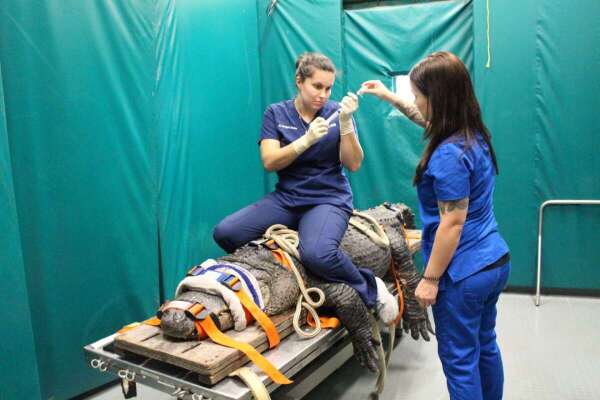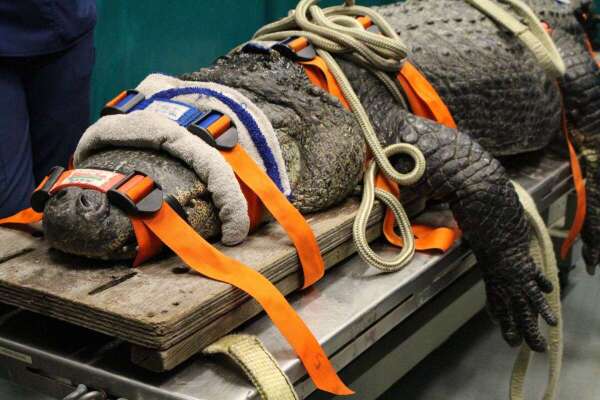Brooke the alligator gets CT scan for ear infection
August 02, 2023
by Gus Iversen, Editor in Chief
The team at the University of Florida College of Veterinary Medicine had its hands full last week when a 376-pound gator showed up from the St. Augustine Alligator Farm Zoological Park exhibiting symptoms of distress.
Brooke, a "very popular" resident of the park for nearly two decades, was transported from his lagoon to undergo a thorough work-up to figure out why he was behaving strangely, (intermittent head-rolling was cited as one symptom).
As part of the diagnostics, Dr. Bridget Walker, a UF zoological medicine resident, performed a blood draw from the venous spinal sinus, located on the top of the American alligator's head for lab analysis.
The CT scan was performed using a Toshiba Aquilion Prime system, which boasts a scanning table capable of withstanding 660 pounds. Brooke, who was named for the Brookfield Zoo where he originally came from, was strapped to a board to undergo the exam.
Although the scanner has a wide, 78-centimeter bore, it was insufficient for performing a full-body scan on Brooke. Instead, they captured CT images of the reptile's head and followed up with lung X-rays.
Ultimately, the University of Florida team diagnosed Brooke with an ear infection. Recovery will depend on taking prescribed medications back at home in the St. Augustine Alligator Farm Zoological Park lagoon.
"We train with our animals frequently, and Brooke has years of experience coming to his name, accepting food (sometimes with medicine), and holding still," the park wrote on Facebook. "Some of our crocodilians are trained to remain still for blood draws without restraining them. So however Brooke needs medical treatment, he will be able to receive it without any stress or worry."
Brooke, a "very popular" resident of the park for nearly two decades, was transported from his lagoon to undergo a thorough work-up to figure out why he was behaving strangely, (intermittent head-rolling was cited as one symptom).
As part of the diagnostics, Dr. Bridget Walker, a UF zoological medicine resident, performed a blood draw from the venous spinal sinus, located on the top of the American alligator's head for lab analysis.
Dr. Bridget Walker, a zoological medicine resident at UF, hands off a sample to Kara Prater, CVT, for processing in the lab. (Photo by Sarah Carey)
The CT scan was performed using a Toshiba Aquilion Prime system, which boasts a scanning table capable of withstanding 660 pounds. Brooke, who was named for the Brookfield Zoo where he originally came from, was strapped to a board to undergo the exam.
Although the scanner has a wide, 78-centimeter bore, it was insufficient for performing a full-body scan on Brooke. Instead, they captured CT images of the reptile's head and followed up with lung X-rays.
Ultimately, the University of Florida team diagnosed Brooke with an ear infection. Recovery will depend on taking prescribed medications back at home in the St. Augustine Alligator Farm Zoological Park lagoon.
"We train with our animals frequently, and Brooke has years of experience coming to his name, accepting food (sometimes with medicine), and holding still," the park wrote on Facebook. "Some of our crocodilians are trained to remain still for blood draws without restraining them. So however Brooke needs medical treatment, he will be able to receive it without any stress or worry."


